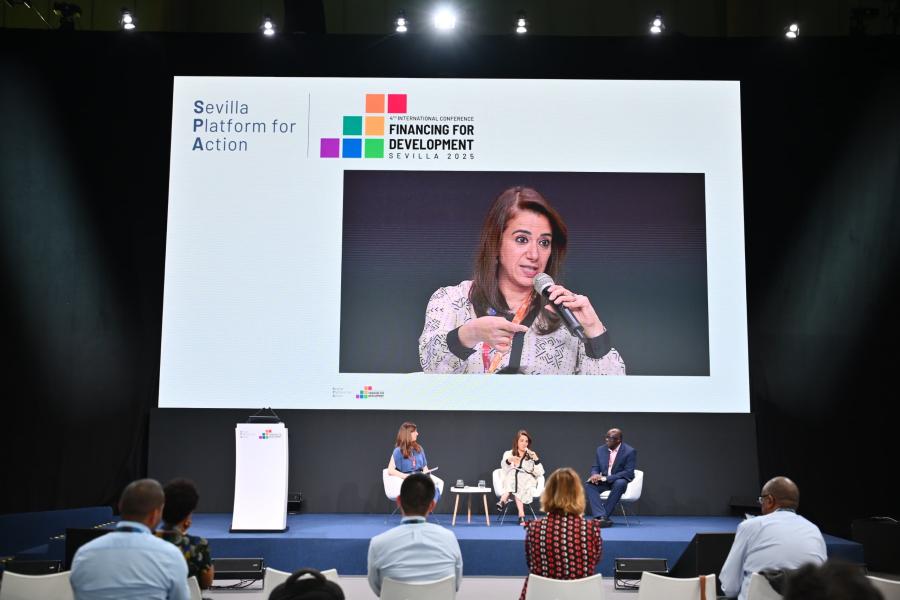C3A at FfD4 in Sevilla: Building Collective Capacity for Climate Resilience
 C3A at FfD4
C3A at FfD4
In July 2025, global actors gathered in Sevilla to agree on the future of financing for development. They launched the Sevilla Platform for Action (SPA), an ambitious agenda of 130 high-impact initiatives to accelerate sustainable development and climate resilience: the Compromiso de Sevilla, the outcome document of the Fourth International Conference on Financing for Development (FfD4). What sets the SPA apart is its operational focus: this is not just a collection of commitments, but a roadmap for delivering systemic change through coordination, accountability, and country-led partnerships.
C3A was invited to contribute to two critical conversations in Sevilla, highlighting its growing role as a trusted platform for strengthening institutional capacity at the intersection of macroeconomics and climate action.
Spotlight on Africa: Advancing Climate-Resilient Economies
C3A supports “Macroeconomic Action for Climate Resilience in Africa (MACRA): Supporting African Countries to Build Climate-Resilient Economies. led by the United Nations Economic Commission for Africa (UNECA) and the Coalition of Finance Ministers for Climate Action (CFMCA). Represented in Sevilla by Sam Mugume from Uganda’s Ministry of Finance, Planning & Economic Development & Deputy Co-Chair of the Coalition of Finance Ministers for Climate Action, Nadia Ouedraogo, Economic Affairs Officer at United Nations Economic Commission for Africa Economic Affairs Officer at United Nations Economic Commission for Africa, and Piera Tortora, Head of the 4P Secretariat and representing C3A in Sevilla, the event emphasized the critical role of Ministries of Finance in shaping integrated responses to the overlapping pressures of climate change and economic development.
The MACRA initiative seeks to provide African countries with tools and policy frameworks to design macroeconomic strategies that are climate-resilient and aligned with long-term national development goals. Its focus on fiscal governance, institutional reform, and public investment planning resonates deeply with C3A’s own work across Africa, Latin America, and Central Asia. As climate risks reshape the global economic landscape, building the economic architecture for resilience is not a luxury; it is a necessity.
The Next Generation of Country Platforms
Together with the Organization for Economic Co-operation and Development (OECD) and CONCITO, C3A co-hosted a closed-door workshop on country platforms. At the heart of the discussion is that country platforms, if properly designed and supported, serve as powerful mechanisms for consolidating fragmented climate finance efforts and enabling strategic transformation.
As Asger Garnak, Investment and Finance Lead at CONCITO, emphasized, “Country Platforms can be an important tool to address the existing fragmentation of international support and cooperation. While Country Platforms need to be country-owned and aligned with national priorities, the international ecosystem of support must drive the necessary consolidation and streamlining in support of more strategic and coherent collaboration, including through Country Platforms.”
Participants explored how country platforms can serve multiple functions simultaneously, beyond project identification or donor coordination. These platforms must also support investment planning, strategic visioning, building financing strategies for the transition, and cross-ministerial coordination. That integrated structure is what makes them uniquely valuable in today’s rapidly changing development landscape.
Bastien Bedossa, Program Manager at C3A, captured the underlying challenge when he noted, “What we are seeing is a shift from country platforms as coordination tables to platforms that can drive institutional innovation. If we want credible, financed, and durable transition plans, we need to invest in the tools, people, and structures that make these platforms work.” The complexity of ecological transitions, especially their macroeconomic implications, requires country platforms to evolve into strategic instruments for long-term policy coherence.
The OECD echoed this perspective, emphasizing that country platforms should serve as frameworks for more permanent and coherent cooperation. Geraldine Ang, Senior Policy Analyst at the OECD noted, “Country platforms appear as a promising solution to align international public and private investment flows with national priorities, to enhance national ownership of cooperation programmes, and to reduce fragmentation. Such initiatives often encompass an attempt to set up institutions capable of mobilising investments as programs. To mobilise finance and investment for climate action, a long-term vision, clear national targets and coherent policies are key. Country platforms can create a forum to gather institutions and people with common goals.” This call for durable structures, political buy-in, and policy integration directly aligns with our common vision of capacity-driven climate action.
A Shared Agenda for Innovation and Impact
C3A also works with the Sustainable Development Solutions Network (SDSN), Caribbean States and several UN agencies to promote Knowledge-exchange, capacity-building and innovation to enable F4D. This involves bringing together representatives from the private, academic and public “silos” into rooms to learn, innovate and develop analytics and narratives to address the provision of finance for Global Public goods across governments. Capacity is the central gap which C3A and its partners seek to address through this initiative.
Together, the Sevilla Platform for Action, the MACRA initiative, and the evolution of country platforms point to a shared agenda: empowering governments, particularly Ministries of Finance, to take ownership of complex, long-term transformations. C3A sees its role as both facilitator and amplifier of these efforts, working with ministries, development partners, and knowledge institutions to equip public institutions with the technical capabilities, governance frameworks, and collaborative platforms needed to succeed.
Going forward, C3A will continue to deepen its engagement on the country platform agenda with its regional partners, providing support in areas such as integrated transition planning, fiscal policy innovation, and climate-informed macroeconomic knowledge and tools. At the same time, it will remain actively engaged in initiatives like MACRA, ensuring that regional and country-level efforts are informed by global dialogue and grounded in local realities.
C3A thanks the OECD and CONCITO for the opportunity to co-organize the second session of its country platform workshop, UNECA, the CFMCA and the 4P for representing C3A during the MACRA event, SDSN for its partnership on capacity and innovation to implement the FfD4 agreements, and the FfD4 organizers for inviting us to contribute to the Sevilla Platform.
